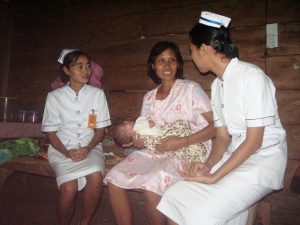Memo #226
 Indonesia has one of the highest maternal mortality ratios (MMR) in Southeast Asia at 228 maternal deaths per 100,000 live births—double the Millennium Development Goal target number of 102 for the country in 2015. Lower levels of education and esteem for traditional birth attendants are influencing more than one third of Indonesian women to deliver at home. Women in the province of West Java in particular face a higher risk of maternal and neonatal mortality.
Indonesia has one of the highest maternal mortality ratios (MMR) in Southeast Asia at 228 maternal deaths per 100,000 live births—double the Millennium Development Goal target number of 102 for the country in 2015. Lower levels of education and esteem for traditional birth attendants are influencing more than one third of Indonesian women to deliver at home. Women in the province of West Java in particular face a higher risk of maternal and neonatal mortality.
West Java reported the highest proportion of home births of Javanese provinces (37%), usually attended by traditional birth attendants (TBAs). Poverty, younger maternal age and lower education, especially in rural areas, contribute to reduced access to maternal health care services. The posting of medically trained midwives in rural areas as part of a government program has raised the proportion of births with a trained attendant. However, many midwives choose to move to more lucrative positions in health centers or into private practice. As a result, women in these villages are more likely to trust a TBA for help during pregnancy and delivery. TBAs are available at any hour of the day, and are familiar to the community. Many women still perceive home delivery as more convenient, citing barriers like the distance to health facilities, cost of transportation and higher delivery fees with a midwife.
Cultural values in rural West Java also favor TBAs. New public insurance measures offer women comprehensive maternal health services at no charge. However, misconceptions and a lack of awareness among women about this insurance mean continued reluctance to access health facilities. As a result, women choose TBAs who accept non-monetary reimbursement; but these mothers and their infants are at greater risk of maternal and infant death when complications arise.
Interventions to increase access to health facilities with trained staff are an important part of reducing Indonesia’s MMR. Addressing all Javanese provinces with the same approach, however, does not acknowledge the differences across the island. Future efforts must identify provincial factors, like strong traditional practices and lower maternal education in West Java, to improve access to maternal health services and reduce maternal and neonatal deaths.
About the Author:
Christian Laugen is a PhD student in the School of Population and Public Health, University of British Columbia. His research focuses on maternal and neonatal health services in Indonesia.

Young midwives consult with a new mother about her infant as part of their clinical training in Java. Photo: Christian Laugen.
Links:
- Ronsmans, C., Scott, S., Qomariyah, S. N., Achadi, E., Braunholtz, D., Marshall, T., Pambudi, E., et al. (2009). Professional assistance during birth and maternal mortality in two Indonesian districts. Bulletin Of The World Health Organization, 87(6), 416–423
- Titaley, C. R., Hunter, C. L., Dibley, M. J., & Heywood, P. (2010). Why do some women still prefer traditional birth attendants and home delivery?: a qualitative study on delivery care services in West Java Province, Indonesia. BMC Pregnancy and Childbirth, 10, 43
- A Matter of Life and Death, The Jakarta Post, January, 2010
- 14 Baby Deaths a Day in W. Java, The Jakarta Post, April, 2012
- Indonesia Battles Maternal Deaths, Al Jazeera, May, 2010
Related Memos:
- See our other memos on Indonesia
Comments are closed, but trackbacks and pingbacks are open.